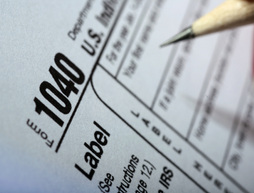For the young person, taxes can be a scary thing. Most high schools (at least, the ones around here) don’t go over something as important as taxes when they should. As an accountant, I could probably write a hundred pages on the subject, but if you’re like most people, all you’re concerned with is whether or not you’re getting anything back after you file. This article is dedicated to the newbies who need a little help with the basics.
1040…everyone’s favorite number.
Note: The below should not be construed as tax advice. It is simply basic information and yes, I intentionally left stuff out for the purpose of not overloading the readers who are new to taxes.
First, it’s important to understand how they work. In a nutshell, the government, state, and local municipality take a portion of your income every year, usually one paycheck at a time. When you start a job, the employer makes you fill out forms and whatnot. One of those forms is a W-4. This tells the employer how much to withhold from your paycheck for taxes. The employee fills out the form and lists how many dependents they have. This number is important…the higher the number, the less taxes that are withheld paycheck to paycheck. In the perfect world, listing the correct number of dependents would mean that when you file at the end of the year, you would have paid the correct amount of taxes down to the dollar throughout the year and will neither receive a refund nor have to pay taxes. It doesn’t always turn out that way due to a number of factors. No one checks the number of dependents you list so if you make a mistake and list a number too high, you’ll end up owing at the end of the year. Some people claim zero on their W-4 so that more is withheld from their pay which almost assures them a refund at the end of the year assuming no oddball situations.
So you’ve worked all year, or some of the year, and it is now January of the new year. Should you be filing your taxes now? We have to wait for something called a W-2 which is sent out by your employer outlining all of the information you’ll need to file your taxes. It lists the income for that tax year, the taxes paid, and other things important for tax time.
Employers, banks, various companies, etc have until January 31st to send out all of the relevent tax documents to people who are due tax forms. The common mistake often made is that some people complain when they don’t receive their tax forms by January 31st, when in fact, companies have until January 31st to physically drop them in the mailbox. There are other forms you may need to wait for, depending on your situation. If you pay interest on college loans for example, you may receive a 1098-E. If you’re not sure if you’ve received everything you’re supposed to get, give it a week or two after January 31st to ensure that everything that is supposed to come in does. You may also want to ask a tax accountant to see what forms you should be getting based off of your financial situation…there are special cases for almost everything. You usually have until April 15th to file.
When you’re sure you have everything in, it’s time to actually file. Please note that when filing taxes, there are a lot of “if, then” statements that will affect the outcome of your bottom line. Some people may not even need to pay taxes due to various reasons.
Boba Fett is going to be pissed when he finds out that half of his bounty went to taxes.
Personally, I recommend TurboTax online. It will take you by the hand, step by step, and even explains why you may or may not be due certain credits or deductions. All you need is a computer and an updated internet browser. It’s also cheaper than companies like H&R Block. I’ve used TurboTax for over five years and haven’t regretted it. I have the ability to set up direct deposit so that within a week or two, the refund is in my bank account electronically. I can also file my state taxes (separate from federal taxes) at the same time for a fee. There is a small amount of work on my part when I use TurboTax, but it’s a small price to pay for the fifty bucks I save using it over a large company that services and prepares taxes.
Still, taxes can be overwhelming for those who don’t know much about them. What’s head of household? Should I be picking single instead of head of household? What qualifies as a dependent? I have step children, do they count as dependents? Earned Income Credit…do I qualify? I’m married, should I file separately or jointly? Someone claimed me already on their taxes, do I have to file? I earned social security this year, is that taxed? What about that home buyer credit I heard about, is it still there? What about donations to charity? I have a HSA and a Roth IRA…does that factor in somehow? I have joint custody of my daughter, should my ex claim her on her taxes or should I?
I don’t care how many you catch, you still can’t claim Pokémon as dependents.
Yeah…it’s a lot, and can be frustrating for those not in the know. It is even more frustrating for home owners and for those who itemize their deductions. Sometimes it’s easier just to pay the hundred bucks or whatever it is for companies like H&R Block to do it for you, and there is absolutely nothing wrong with that.
To wrap things up, below is a short list of tips that may ease your tax filing woes. Happy tax…filing…thingy!
-Keep your bank account info handy for payments and refunds. This would include your bank name, routing number, and account number. If you’re not sure what you’re routing number is, take a look at the bottom of one of your blank checks. It’s commonly a nine digit number. If you’re not sure, ask your bank.
-Keep your tax forms from previous years handy, they may be needed. For example, when setting up TurboTax for the first time in 2005, I was asked for 2004′s income as a security question when setting up my electronic signature.
-If you have dependents, keep their names and social security numbers handy.
-Make sure you update your address if you’ve moved and any contact information should it change.
-Make sure you have all of your W-2s, 1098/1099s, and relevant tax documents before filing.
-Make sure you remember to file your local municipality and state taxes as well.
-Consider direct deposit for refunds, you’ll get your money a lot faster.
-If you itemize deductions, keep records and receipts for EVERYTHING!!! People who itemize have a greater chance of being audited as opposed those who take the standard deduction.



